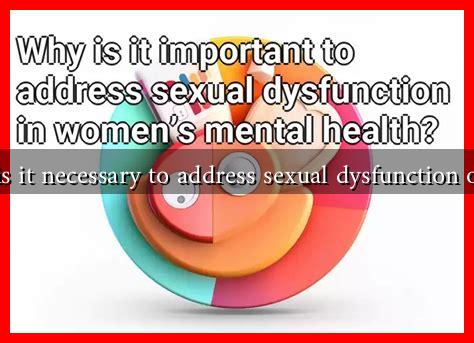-
Table of Contents
Why is it Necessary to Address Sexual Dysfunction Openly?
Sexual dysfunction is a common yet often stigmatized issue that affects millions of individuals worldwide. Despite its prevalence, many people suffer in silence due to societal taboos, lack of information, and fear of judgment. Addressing sexual dysfunction openly is not just a matter of personal health; it is essential for fostering healthy relationships, improving mental well-being, and promoting overall quality of life. This article explores the importance of open discussions about sexual dysfunction, the barriers to such conversations, and the benefits of breaking the silence.
The Prevalence of Sexual Dysfunction
Sexual dysfunction can manifest in various forms, including erectile dysfunction, premature ejaculation, low libido, and difficulties with arousal or orgasm. According to the National Institutes of Health, approximately 30% of men and 43% of women experience some form of sexual dysfunction at some point in their lives. These statistics highlight the widespread nature of the issue, yet many individuals remain reluctant to seek help or discuss their experiences.
Barriers to Open Discussion
Several factors contribute to the reluctance to address sexual dysfunction openly:
- Stigma and Shame: Many individuals feel embarrassed or ashamed about their sexual issues, fearing judgment from peers or partners.
- Lack of Education: There is often a lack of comprehensive sexual education, leading to misinformation and confusion about sexual health.
- Cultural Norms: In many cultures, discussing sexual matters is considered taboo, further discouraging open dialogue.
- Fear of Relationship Impact: Individuals may worry that discussing sexual dysfunction could harm their relationships or lead to rejection.
The Importance of Open Dialogue
Addressing sexual dysfunction openly can lead to numerous benefits, both for individuals and their relationships:
- Improved Mental Health: Open discussions can alleviate feelings of isolation and anxiety associated with sexual dysfunction. A study published in the Journal of the American Medical Association found that individuals who openly discussed their sexual issues reported lower levels of depression and anxiety.
- Enhanced Relationships: Communication is key to any healthy relationship. Discussing sexual dysfunction can foster intimacy and understanding between partners, leading to stronger emotional connections.
- Access to Treatment: Open dialogue encourages individuals to seek professional help. Many effective treatments are available for sexual dysfunction, but they often go unutilized due to stigma.
- Increased Awareness: By discussing sexual dysfunction openly, society can work towards reducing stigma and increasing awareness about sexual health issues.
Case Studies and Real-Life Examples
Consider the case of John, a 45-year-old man who experienced erectile dysfunction. Initially, he felt embarrassed and avoided discussing it with his partner. However, after attending a support group where participants shared their experiences, he found the courage to talk to his partner. This open communication not only helped him seek treatment but also strengthened their relationship, as they learned to support each other through challenges.
Similarly, Sarah, a 32-year-old woman, struggled with low libido. After reading articles and joining online forums, she realized that her experiences were not unique. By discussing her feelings with her partner, they were able to explore underlying issues together, leading to a more fulfilling sexual relationship.
Conclusion
Addressing sexual dysfunction openly is crucial for individual well-being and relationship health. By breaking the silence surrounding this common issue, we can reduce stigma, promote understanding, and encourage individuals to seek the help they need. Open dialogue not only enhances mental health and relationship satisfaction but also fosters a more informed and compassionate society. It is time to prioritize conversations about sexual health and create an environment where individuals feel empowered to share their experiences without fear of judgment.

